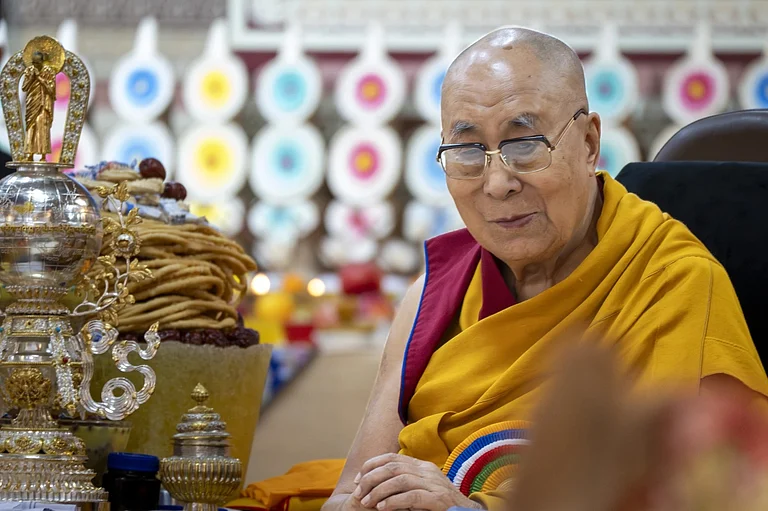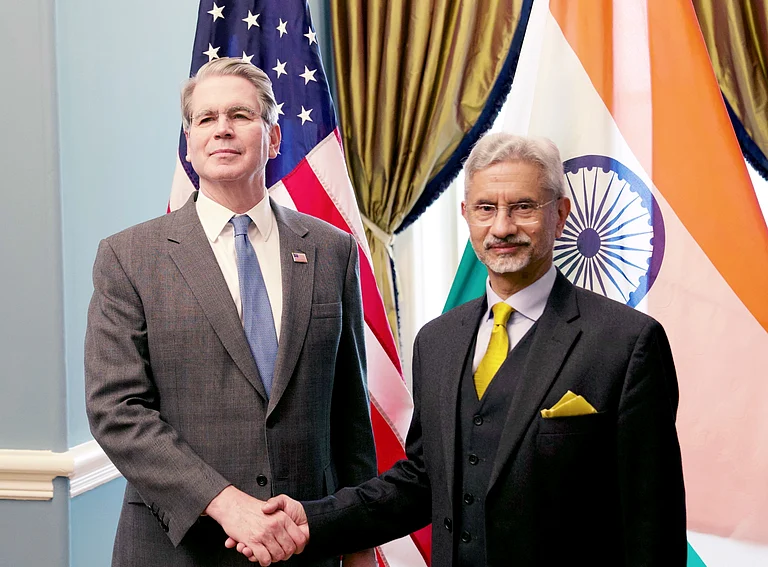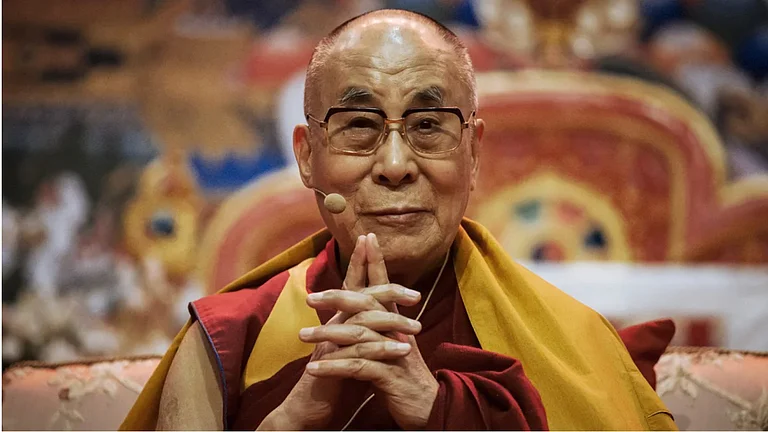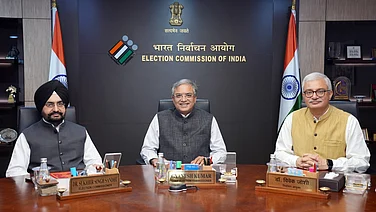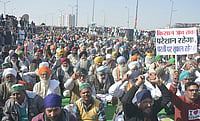The Tibetan spiritual leader the Dalai Lama arrived in New Delhi on Friday for the first time in three years.
The Dalai Lama will be in Delhi for five days. It is not yet known if he will hold any meeting with Indian politicians or officials.
Earlier, the Dalai Lama was in Ladakh for a month, where he met top Indian officials and engaged with the Indian military as well. The engagements were significant as they took place in the midst of the ongoing India-China stand-off in Ladakh, which China claims as part of its own territory.
The Government of India's engagement with the Dalai Lama or any activity regarding Tibet or Tibetans in general discomforts China as it views the Dalai Lama as a separatist leader. Like Taiwan and Tiananmen Square massacre, Tibet is a highly sensitive subject for China on which Beijing does not want open discussions.
Here we explain how and why New Delhi has increased engagement with Tibetans in recent years and what's its significance.
New Delhi's re-engagement with Tibetans
In 2018, the Government of India asked senior leaders and officials to not attend key events marking 60 years of Tibetans' exile in India.
In 2022, Prime Minister Narendra Modi publicly wished the Dalai Lama on his birthday for the second year in a row, the Dalai Lama travelled in Indian military aircraft in Ladakh, and Indian leaders are openly attended Tibetan events.
This shift in Indian stance on Tibetans has come in the midst of worsening relationship with China, rooted in Chinese military aggression in Eastern Ladakh and violation of existing border agreements.
Not just Modi but Union ministers, state chief ministers, and even the Indian military have also publicly engaged with the Tibetans in recent years.
During his month-long stay in Ladakh, the Union territory's Lieutenant Governor RK Mathur met the Dalai Lama. Moreover, he also addressed an event organised by the Ladakh Autonomous Hill Development Council.
The Dalai Lama was also flown by the Indian Air Force in Ladakh. Notably, China claims Ladakh as its own territory and also considers the Dalai Lama a separatist. Therefore the move was considered a snub from India to China.
In December 2021, six MPs across party lines, including Union minister Rajeev Chandrasekhar, attended an event organised by Tibetan Parliament-in-Exile, to which the Chinese Embassy in New Delhi had reacted angrily. Against diplomatic norms, the embassy wrote letters directly to MPs rather than registering protest with the Ministry of External Affairs. This was indicative of Chinese anxiety over increased Indian engagement with Tibetans.
The acknowledgement, deployment of secretive Tibetan force
The increased Indian engagement and its public display could be traced to the India-China stand-off over Ladakh beginning in early 2020. It increased as New Delhi hardened its stance on China and anti-China sentiment peaked in the country after the Galwan incident, in which 20 Indian soldiers were killed in skirmishes with the Chinese.
The extent of New Delhi's defiance of Chinese sensitivities regarding Tibet could be understood with the fact that India has publicly admitted the deployment of Special Frontier Force (SFF) on frontlines with China. Until 2020-21, the very existence of the force was in shadows.
The SFF is an ultra-secretive special force that was basically an "undeclared" armed force until 2020-21 operating under India's external intelligence agency Research and Analysis Wing (RAW). Formally, it functions through Cabinet Secretariat, which is directly under the Prime Minister's Office.
The SFF was initially raised with Tibetans in exile in India. Though now it recruits Gorkhas and Indians as well as per operational requirements. It was publicly acknowledged in 2021 in a landmark shift when the then-Chief of Defence Staff General Bipin Rawat met SFF personnel.
"General Bipin Rawat CDS visited forward Air Force bases in Eastern Sector and interacted with Indian Army, ITBP and SFF soldiers deployed at the forward most air maintained post in Dibang Valley and Lohit Sector of Arunachal Pradesh," said the Indian Army in an Instagram post at the time.
Deploying SFF personnel against the Chinese is also symbolic as a community in exile from their homeland is facing Chinese soldiers with arms. The SFF personnel, including Tibetan service personnel, also participdated in active operations during the India-China stand-off and have been recognised for their gallantry in an unprecedented action.
"Tsering Norbu was named under Mention-in-Despatches category, a gallantry recognition for his role in Operation Snow Leopard- the ongoing Indian Army action in Eastern Ladakh," reported India Today.
Another Tibetan SFF soldier, Subedar Nyima Tenzin, was killed while deployed in Eastern Ladakh. Visuals of Tibetans in exile blessing SFF personnel being deployed to the frontlines were also released in yet another signal that New Delhi is no longer sensitive to Chinese concerns on Tibet.
Reasons, significance of shift on Tibet
The ongoing India-China stand-off in Eastern Ladakh, which has taken the India-China relationship to their worst point since the 1962 War, is central to New Delhi's shift in stance on Tibet.
While China wants New Delhi to separate the boundary dispute from the broader bilateral relationship, New Delhi has made it clear that the two cannot be separated. External Affairs Minister S Jaishankar has said multiple times that broader cooperation and border conflict cannot go together.
"The [India-China] relationship is at a crossroads and which direction it will go depends on whether China adheres to the 1988 consensus and follows through on agreements over the decades...What was very clear last year was that border tensions cannot continue with cooperation in other area," said Jaishankar at an event last year.
The idea is simple: If China does not care about Indian sensitivities, then India would also not care about China's sensitivities. This is visible in not just India's engagement with Tibetans but also in other areas. New Delhi went ahead with 5G trials without Chinese companies, amended investment rules to prevent Chinese hostile takeovers, and have also been assertive in direct political messaging.
New Delhi did not wish Beijing on 100th anniversary of the Chinese Communist Party. India Today reported, "Ministry of External Affairs spokesperson reportedly said 'it was not a government matter' as it was a party celebration and not the official National Day of China which falls on October 1. However, the shift is significant since such an important day for Beijing would not have gone amiss if things were better between the two sides."
On Modi's public greetings to the Dalai Lama, China expert Manoj Kewalramani told India Today, “I see the public acknowledgement by the Prime Minister as significant in terms of signalling to Beijing. The Indian government appears to be telling the Chinese leadership that it is much more willing to touch upon matters that Beijing might consider sensitive, particularly if China is unwilling to take India’s sensitivities and interests into account, say with regard to the boundary issue.”
The Dalai Lama's recent travel in India Air Force helicopter was also seen as a message to China. "The latest move by Prime Minister Narendra Modi’s government in New Delhi to send out a subtle-but-firm message to Beijing came just days after the Speaker of the United States House of Representative Nancy Pelosi visited Taipei, defying repeated warnings from China, which responded by launching a week-long military drill across the Taiwan Strait," noted Deccan Herald.
The Tibet dispute explained
The Dalai Lama escaped to India in 1959 after a Tibetan uprising against the Chinese rule failed.
The Chinese had invaded Tibet in 1949-50 and had annexed it. Though they pledged to keep Tibet’s traditional government and religion in place, Tibetans felt persecuted and saw their cultural sphere being eroded which led them to rebel unsuccessfully.
The Tibet dispute, simply speaking, is about the relationship between Tibet and China. While Tibetans claim their homeland was never part of China, the Chinese claim it's an integral part of their country.
Scholars maintain that the Tibet-China relationship is a complex issue, as while there is evidence for Tibet's independent conduct in history, this is also a fact that no foreign government recognised Tibet as an independent country and Lhasa's relationship with Beijing has at times been understood as that of overlordship — such as that of Indian princely states and the British Raj.
While the Tibetans initially called for Independence, their government-in-exile and the Dalai Lama have over the years softened their position to a "middle way" approach, which would be a settlement with Beijing for a peaceful co-existence without outright independence.







